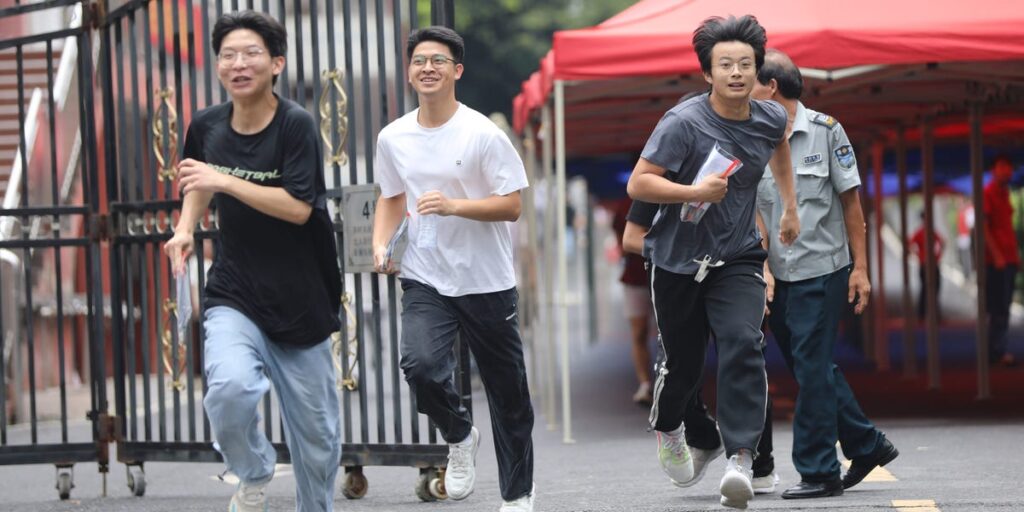In China, one exam can decide your future, and this year, students weren’t allowed any help from AI.
As millions of high school seniors began sitting for China’s notoriously grueling “gaokao” college entrance exam from Saturday, the country’s biggest tech firms quietly pulled the plug on their AI tools.
Apps from Tencent, ByteDance, and Moonshot AI disabled features like photo recognition and real-time question answering, a move aimed at preventing students from using chatbots to cheat during the high-stakes national exam.
Last month, China’s education ministry warned students not to rely on AI-generated answers for assignments or tests, even while promoting AI education from a young age.
This year, about 13.4 million students are taking the “gaokao,” which runs from Saturday to Tuesday, according to local media.
Unlike the US college admissions process, which often considers essays, extracurriculars, various standardized exams, and school records, China’s system leans almost entirely on this one test. For many students, especially those from rural or low-income backgrounds, the “gaokao” is a once-a-year shot at social mobility.
That kind of pressure has fueled an arms race in test prep, from private tuition centers to after-school cram schools. But over the weekend and into this week, AI was off the table.
Chinese chatbots go dark
Screenshots posted by users on the Chinese app Rednote showed that popular AI chatbots like Tencent’s YuanBao, ByteDance’s Doubao, and Moonshot AI’s Kimi had disabled exam-relevant features during testing hours.
In one post on Sunday, a user who goes by “DKK” attempted to upload what appeared to be a test paper to Doubao. The chatbot immediately shut it down: “The image content is not compliant and the upload failed.”
In another screenshot posted on Monday, user “Gemini0612” asked Doubao for help with a question. The chatbot responded with a notice: “We are very sorry. In order to ensure the fairness of the college entrance examination, Doubao’s Q&A function will be temporarily closed during the examination period and will be restored after the examination at 6.45 p.m. this afternoon. Thank you for your understanding and support, and wish all candidates good luck in the college entrance examination.”
Tencent’s YuanBao replied with a similar message in another screenshot posted Monday: “Dear users, to ensure fairness in the college entrance examination, this function is not available during the college entrance examination period. Tencent’s Yuanbao wishes all candidates success in the exam.”
Tencent’s chatbot offers users a choice between its in-house Hunyuan model and DeepSeek’s R1. The Shenzhen-based tech giant has integrated both models across its vast ecosystem, including WeChat, China’s biggest social media app used by nearly 1.4 billion people.
Moonshot AI’s chatbot Kimi also locked down its photo-recognition and question-answering functions. In a Rednote post on Sunday, a user who said he is a college student uploaded a photo of a question and asked Kimi for help. The chatbot responded with another canned message about ensuring fairness during the college entrance examination period.
The user pushed back: “I am not a college entrance examination candidate. The college entrance examination does not test this.”
But Kimi didn’t budge.
Tencent, ByteDance, and Moonshot AI did not respond to a request for comment from Business Insider.
China wants students to learn AI — just not use it to cheat
China is all in on AI education.
In China’s capital, Beijing, AI education is compulsory for students, including elementary schoolers.
Starting this fall, schools in the city must provide at least eight hours of AI instruction per academic year, the Beijing Municipal Education Commission said in March.
While the country is racing to build an AI-literate generation, regulators are also drawing a hard line, saying AI is for learning, not for shortcuts.
By pulling the plug during the “gaokao,” tech firms reinforced the message: AI has no place in the exam hall.


